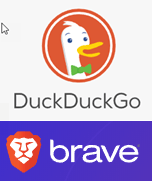Best Browser?

Best Browser? A reader asks…
I have a Windows 10 PC and it came with the Edge browser. It sounds like nobody likes that, so do you have a suggestion for an alternative?
I agree with the others, Microsoft Edge isn’t my preferred web browser. Personally I like Google Chrome, as it fits my needs. That would also be a good choice for anyone who uses a Gmail account. Lots of folks also like the Firefox web browser. Both of these are leading alternative web browsers that each have a fierce and loyal following.

If you’re concerned about privacy, then you might consider using DuckDuckGo or Brave. These alternatives say they’ll do more to protect your privacy by not tracking your surfing habits or history, by blocking hidden trackers (in website coding), and by presenting search results that haven’t been based on your search history.
It is true that Google Chrome does track your search history, but that’s not a completely bad thing. Google is all about connecting you with what you’re looking for, so they use a lot of technology to help figure out what you want. Most of us aren’t good at searching the internet, so we end up having to sift through a lot of site listings to find what we really wanted.
It’s all about the search terms you use: say you’re looking to buy a new couch. You might use search terms like ‘couch’, ‘brown leather’, and perhaps your location (aka ‘near me’). I just tried that and got 668 million search results. The more specific you can be, the better your results will be. How about “sectional, couch, brown leather, seats 6, side recliner, retailer, showroom near me” – that resulted in less than 4 million search results. Still a lot, but I’d likely find what I’m looking for on the first page of the results.
You can also search using a phrase by enclosing specific words in quotes, and other special methods. Our friends at Techwalls.com created a handy graphic you can use to help you better construct search queries:
Regardless of the brand of web browser you use, searching with very specific keywords is the ‘key’ to getting good results.
Most websites will display properly regardless of which web browser you use. I should mention that if you like to read news or other information online, most web browsers have a ‘read’ mode that cuts out lots of the extra items on a web page like ads, sidebars and such. To learn about using Read Mode, check out my article Reading Mode for Web Pages.
If you’re just looking for what’s the most popular web browser, Google Chrome takes the lead, over 79% of web searches are done using Chrome. Firefox is a distant 2nd, with about 10% of web searches, and Edge is used by 4%, followed by Apple’s Safari with just over 3% (source: W3schools.com). Other stat measurers may differ on exact percentages but all place Google way out in front in terms of popularity.
This website runs on a patronage model. If you find my answers of value, please consider supporting me by sending any dollar amount via:
or by mailing a check/cash to PosiTek.net LLC 1934 Old Gallows Road, Suite 350, Tysons Corner VA 22182. I am not a non-profit, but your support helps me to continue delivering advice and consumer technology support to the public. Thanks!







